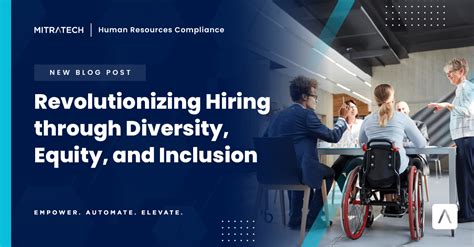As we continue to navigate the complexities of the modern world, it has become increasingly clear that creating a more inclusive and equitable society is not only a moral imperative, but also a crucial step towards unlocking human potential. One key area that holds tremendous promise in driving this revolution is Diversity, Equity, and Inclusion (DEI) technology. In this article, we will delve into the world of DEI tech, exploring its current landscape, benefits, and future prospects, as well as the steps we can take to harness its potential and create a better future for all.
The State of DEI Today
Despite significant progress in recent years, many organizations and societies still struggle to create environments that are truly inclusive and equitable. Women, people of color, and other marginalized groups continue to face systemic barriers to participation and advancement, resulting in a lack of representation and a perpetual sense of exclusion. This not only harms individuals but also stifles innovation, creativity, and economic growth.
DEI technology has emerged as a powerful tool to address these challenges. By leveraging data, analytics, and digital platforms, DEI tech can help organizations identify and mitigate biases, foster more inclusive cultures, and create pathways for underrepresented groups to succeed.
Benefits of DEI Tech
So, what are the benefits of DEI tech? Here are just a few:
- Improved diversity and inclusion metrics: DEI tech can help organizations track and analyze diversity and inclusion metrics, such as demographic data, promotion rates, and employee engagement. This enables them to identify areas for improvement and develop targeted strategies to address these gaps.
- Enhanced talent management: By using AI-powered tools to screen resumes, conduct interviews, and assess candidate fit, organizations can reduce unconscious bias and identify top talent from diverse backgrounds.
- More inclusive workplace cultures: DEI tech can facilitate virtual training programs, workshops, and community-building initiatives that promote empathy, understanding, and a sense of belonging among employees.
- Better decision-making: By incorporating diverse perspectives and experiences into decision-making processes, organizations can avoid groupthink, reduce risk, and drive more informed and sustainable decision-making.

Key Players in the DEI Tech Space
The DEI tech landscape is rapidly evolving, with a range of innovative players entering the market. Here are a few notable companies and initiatives:
- Textio: An AI-powered platform that analyzes job descriptions and recruitment materials to detect bias and provide inclusive language suggestions.
- Blind: A social platform that enables employees to share anonymous feedback and ratings on company culture, diversity, and inclusion.
- InHerSight: A website that provides women with insights and resources to find and evaluate companies based on their diversity and inclusion track records.
Steps to Harness the Power of DEI Tech
So, how can we harness the power of DEI tech to create a more inclusive and equitable society? Here are a few steps we can take:
- Invest in DEI tech infrastructure: Organizations should invest in robust DEI tech infrastructure, including data analytics tools, AI-powered screening software, and virtual training platforms.
- Develop inclusive product design: Companies should prioritize inclusive product design, ensuring that their digital products and services are accessible, usable, and appealing to diverse user groups.
- Foster a culture of empathy and understanding: Organizations should promote a culture of empathy and understanding, encouraging employees to engage in open and respectful dialogue about diversity, equity, and inclusion.
DEI Tech for Education and Employment
DEI tech has the potential to revolutionize education and employment, enabling more inclusive and equitable access to opportunities. Here are a few ways DEI tech can make a difference:
- Personalized learning platforms: AI-powered learning platforms can provide personalized education and training recommendations, helping students from diverse backgrounds to access relevant resources and support.
- Virtual mentorship programs: Virtual mentorship programs can connect students and young professionals with experienced mentors from diverse backgrounds, providing valuable guidance and support.

DEI Tech for Healthcare and Well-being
DEI tech can also play a critical role in promoting more inclusive and equitable healthcare and well-being outcomes. Here are a few ways DEI tech can make a difference:
- Culturally sensitive healthcare platforms: Culturally sensitive healthcare platforms can provide patients from diverse backgrounds with access to relevant health information, resources, and support.
- Mental health support tools: AI-powered mental health support tools can provide personalized support and resources, helping individuals from diverse backgrounds to manage their mental health and well-being.

Conclusion: Embracing the Future of DEI Tech
As we look to the future, it is clear that DEI tech will play an increasingly critical role in promoting more inclusive and equitable societies. By harnessing the power of data, analytics, and digital platforms, we can create more inclusive workplaces, education systems, and healthcare services. However, this will require ongoing investment, innovation, and collaboration.
We hope this article has provided you with a deeper understanding of the potential of DEI tech and the steps we can take to harness its power. We encourage you to share your thoughts and experiences with DEI tech in the comments below and to join the conversation on social media using the hashtag #DEITech.






What is DEI tech?
+DEI tech refers to the use of technology to promote diversity, equity, and inclusion in various sectors, including education, employment, and healthcare.
How can DEI tech improve diversity and inclusion metrics?
+DEI tech can help organizations track and analyze diversity and inclusion metrics, identify areas for improvement, and develop targeted strategies to address these gaps.
What are some examples of DEI tech for education and employment?
+Examples of DEI tech for education and employment include personalized learning platforms, virtual mentorship programs, and AI-powered recruitment tools.
